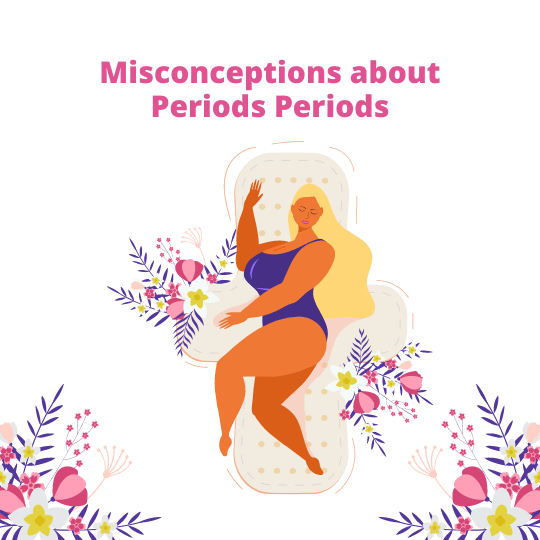Menstruation, often referred to as that time of the month, is a natural and essential bodily function that millions of women experience. Yet, despite its universal presence, misconceptions about periods continue to persist, leading to a significant stigma surrounding this natural process. In this article, we’ll address some of the most common misconceptions about periods, debunk these myths, and provide evidence-based insights to help break the taboos associated with menstruation. By challenging these myths, we can create a more open and informed dialogue about menstrual health, ultimately promoting period positivity.
Common Misconceptions About Periods and Menstruation
Periods are often seen as something to be ashamed of or hidden, but this perception is rooted in myths and misconceptions. It’s time to address these outdated beliefs and shed light on the truth behind menstruation.
1. Myth: Women Should Avoid Exercise During Their Periods
- Fact: One of the most common misconceptions about periods is that women should avoid exercise during menstruation. In reality, exercise can actually help alleviate menstrual cramps and improve mood. Physical activity during periods increases blood circulation, reduces cramps, and boosts endorphins, which can help combat period-related mood swings. Unless there are specific medical concerns such as heavy bleeding, exercise is generally safe and beneficial during menstruation.
2. Myth: Period Blood is Dirty or Impure
- Fact: Another widespread myth is that period blood is dirty or impure. In reality, menstrual blood is simply the shedding of the uterine lining, similar to how blood from a cut or nosebleed is expelled from the body. It’s not a sign of illness, impurity, or uncleanliness. This misconception about periods often leads to unnecessary shame and embarrassment, reinforcing the stigma that menstruation is something to hide.
3. Myth: PMS is Just an Excuse for Mood Swings
- Fact: Premenstrual Syndrome (PMS) is a real medical condition caused by hormonal fluctuations that occur in the second half of the menstrual cycle. Symptoms of PMS can range from emotional symptoms like mood swings, irritability, and anxiety, to physical symptoms such as bloating, fatigue, and headaches. Dismissing PMS as just “mood swings” downplays the significant impact it can have on women’s well-being, making it important to take these symptoms seriously.
4. Myth: Tampons or Menstrual Cups Cause Health Issues
- Fact: Many women are wary of using tampons or menstrual cups because of concerns about potential health risks. However, when used correctly, these menstrual products are safe and effective. It’s crucial to change tampons regularly (every 4-8 hours) to prevent infection and to clean menstrual cups properly. Contrary to the myths, these products do not pose health risks when used according to guidelines.
5. Myth: Periods are Only About Bleeding
- Fact: While bleeding is a prominent aspect of menstruation, it’s not the only component of the menstrual cycle. Misconceptions about periods often focus solely on bleeding, but the cycle involves a complex interplay of hormones that affect various aspects of women’s health. From fluctuating energy levels to changes in skin health and mood, the hormonal shifts that occur during menstruation impact much more than just the bleeding phase.
Dispelling Myths and Promoting Accurate Menstrual Health Education
The perpetuation of these myths around menstruation creates confusion and stigmatization. Medical professionals and health experts emphasize the importance of early menstrual health education to equip individuals with accurate information. Dr. Jane Smith, OB/GYN, explains, “A lack of factual information during puberty leads to much confusion about periods.” This education empowers women to manage their menstrual health confidently and break away from societal taboos.
As health educator Amanda Williams notes, “Periods shouldn’t be taboo. They are a natural process experienced by half the population.” By educating people and fostering open discussions, we can dismantle the myths surrounding menstruation and create a more supportive environment for women.
Promoting Menstrual Health Education and Ending the Stigma
Efforts to destigmatize menstruation are gaining momentum through various initiatives aimed at providing better access to menstrual products, improving sanitation facilities, and integrating menstrual health curricula in schools. A growing movement is calling for the removal of the tampon tax in many countries, recognizing menstrual products as essential healthcare items.
By advocating for these changes and promoting open dialogue about menstrual health, we can make strides toward embracing period positivity and providing women with the support they need to manage menstruation with dignity.
Empowering Women with Knowledge and Accurate Information
Breaking down the misconceptions about periods and providing accurate information is crucial for promoting gender equality and women’s health. When women have access to reliable menstrual health education, they are empowered to make informed decisions about their health, leading to better self-care practices and improved well-being.
By amplifying evidence-based education and fostering open, non-judgmental discussions about periods, we can help eliminate the shame and stigma that still surrounds menstruation. It’s time to embrace period positivity and create a world where menstruation is treated as a normal and natural process, rather than something to hide or be ashamed of.
Conclusion: Embracing Period Positivity and Ending the Myths
In conclusion, misconceptions about periods are rooted in outdated beliefs that no longer serve women’s health or well-being. By challenging and debunking these myths, we can foster a more inclusive and informed society that embraces menstruation as a natural part of life. Education, open dialogue, and breaking the silence around menstruation will help dismantle the stigma, empowering women to confidently manage their menstrual health. Let’s continue to work toward a future where periods are no longer seen as a taboo subject but a shared experience to be respected and supported.

